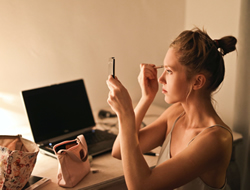Leslie Goldman* asks why women are bemoaning their hair, clothing choices and more, even during the pandemic.
 “Sorry about my hair today. It looks crazy.”
“Sorry about my hair today. It looks crazy.”
“Please excuse my wrinkles.”
“Just ignore my double chin.”
So goes the first five minutes of seemingly every pandemic-era Zoom meeting.
In online meetings, chances are you’ve been on the receiving end of one of these apologies or uttered one yourself.
Over the past seven weeks, sources told Vox, women of all ages and professions have been picking apart their own appearance via teleconference.
A recent New York Times piece reframed sheltering in place as a chance to conveniently shed the superficial trappings of femininity.
Calling it JOLGO (the Joy of Letting Go), author Ruth La Ferla wrote that she’d found it liberating “to sign on with a sisterhood — people of varying ages, racial and social backgrounds, professions, and styles, openly engaging in a little self-neglect”.
But for other women adjusting to working from home (and, in many cases, home-schooling as well), our increasing reliance on video calls has only triggered a virtual backslide on the body positivity front.
Beauty influencers and fashion experts are doling out advice on how to look hot when video chatting.
People are making liberal use of Zoom’s Touch Up My Appearance tool.
Research shows that women say “I’m sorry” more often than men.
We start sentences with tentative, minimising language like, “I’m no expert, but,” and, “I’m probably wrong”.
Compliment deflection is as deeply ingrained as breathing, which Amy Schumer brilliantly depicted in her viral 2013 skit featuring a group of girlfriends explaining away praise with such fervency and one-upmanship that, when one woman actually accepts a compliment, the listeners all self-destruct.
So, the fact that so many women are now prefacing professional and personal video calls with demoralising mea culpas about undereye circles shouldn’t come as much of a surprise.
But experts in body image and gender politics say that in this stress-rich, time-poor environment, the notion that women should be dolling up for virtual meetings, complete with white tablecloths beneath our laptops (they reflect light for a flattering little “fill and bounce”, Tom Ford told the New York Times), is simply the latest evidence of our society’s tenacious, lopsided beauty standards.
“This is just another iteration of the way women in our culture live with what I call our ‘inner monitor’ — the voice in our head that acts like the mean girl from high school, constantly saying some version of ‘You’re not … enough’,” says Rebecca Scritchfield, author of Body Kindness.
“If a global pandemic doesn’t call for a little self-compassion, I don’t know what does.”
But for so many women, self-compassion is elusive.
Body positivity has been in full swing over the past few years.
Yet even as women hear how important it is to love themselves, wrinkles, rolls, and all, “the grooming women are expected to do for the workplace is much different than men”, says Renee Engeln, a psychology professor at Northwestern University and author of Beauty Sick.
We’re far less likely to hear men pre-apologising for their unkempt stubble or pimples because, Engeln says, pressure to keep up appearances is largely directed at women: “We need to wear makeup, colour or blow out our hair, do our eyebrows or lashes, maybe get Botox.”
That level of upkeep has been impossible due to business closures (and frankly, impossible even under normal circumstances).
“So when men see themselves on a video platform, they don’t look that different,” Engeln says.
“The reality of the differential demands we put on women are just showing up in a different context.”
It may boil down to the fact that men simply don’t think they have as much to be sorry for.
In a seminal 2010 Psychological Science study, researchers found that women apologise more than men mainly because women are more likely to think they did something that warrants apology.
Men, they wrote, “have a higher threshold for what constitutes offensive behaviour”.
Study co-author Karina Schumann, a social psychologist at the University of Pittsburgh, says, “Women feel we need to be attractive to be liked, and now we’re worried we’re not meeting those standards, even though it’s because we’ve been running around like maniacs.”
And the self-hatred starts early.
Natasha Bloom, a teacher at an all-girls primary school, says that when remote learning began, she was confused because “all I saw were ceiling fans”.
With some gentle prodding, Bloom learned that her students hated seeing themselves on camera.
Many of these same pre-teens are on Snapchat and Instagram, but, she says, “They use a lot of face filters so they don’t exactly look like themselves.”
Superfluous apologising is a decidedly female trait with a major downside.
“It devalues whatever message you’re trying to send,” Professor of Counselling at Northern Illinois University Suzanne Degges-White says, “undermining our right to speak.”
“It sounds like we’re assuming that we don’t have the right to say what we’re about to say.”
Not all women feel the need to explain away their quarantine looks.
Attorney Stacey Lager says when she sees other women feeling like they need to justify their looks, “I want to say, ‘Why are you apologising? We’re in unimaginable circumstances. You’re performing at A+ levels. Thanks for working hard, for staying focused, thanks for not having a complete mental breakdown.’”
Scritchfield, the body positivity author, applauds Lager’s perspective.
“Just because someone else makes an appearance apology doesn’t mean you have to participate,” she says.
“You might feel pulled to engage as a form of small talk or emotional support, but consider the best support in this case saying nothing if you’re in a group.”
Or, you could try course-correcting with something compassionate along the lines of, “Yeah, I was thinking I should have spent more time getting ready, but that’s ridiculous, all things considered.”
At least this way, Scritchfield says, “You’re helping to tear down the standards that suggest women should spend more time earning the right to be present at virtual meetings through their appearance.”
* Leslie Goldman is a health writer based in Chicago.
This article first appeared at www.vox.com.








